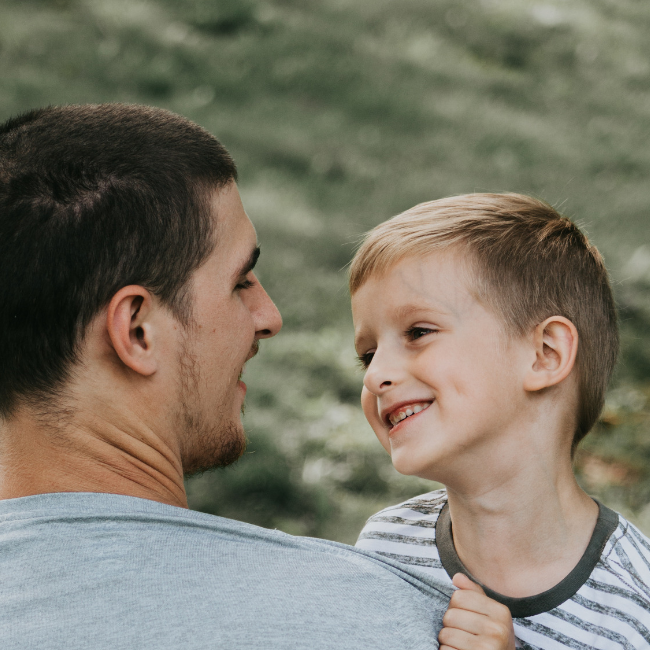In my experience parents often become ineffective helping their children avoid pornography when they discover how honest they must be for that process to actually work. I’m not talking about the child’s honesty, but the parent’s.
Too many parents have embraced a refusal to be real with their children as a fear-based response to their own brokenness. I hear excuses like: “It’s too personal,” or “My kids wouldn’t respect me if they knew what I’ve done,” or “That feels too invasive to discuss.” However, the brutal honesty these parents fear would open the door for their children to effectively resist pornography.
What Kind of Honesty?
We should not be discussing ways to avoid pornography with our children in a vacuum. Pornography is deeply intertwined with body image, beliefs about the purpose of sexuality, sexual fantasy, masturbation, and even emotions. If we are going to talk to our kids about pornography, we will need to address all these issues with them over time .
Here is where honesty comes in: I recommend that every conversation related to sexuality should start with the parent telling their own story first. If we are going to have a discussion with our child about the connection between sexual fantasy and pornography that means we start by telling at least some of our own history with sexual fantasy and pornography.
Then parents start saying, “That’s too personal,” or “My kids wouldn’t respect me if they knew what I’ve done,” or “That feels too invasive to discuss.”
The truth is, when a parent is honest about their own sexuality, their child suddenly realizes they can come to their parent with any question about sex. They learn that their parent understands how they feel inside and is a safe person to share that with. Is that not what we want to happen?
The alternative is our child decides we are not really being honest with them so they go to their friends or the internet for answers. We all know how that will turn out.
But That’s Too Hard!
It is not too hard. It’s just really scary. It is only scary at first, however.
Once we start being honest with our children about sex, we find our children very happy with our transparency. The scary part ends rather quickly as we enter into a whole new dimension of relationship with our child. A fully honest relationship with our child is where we find comfort in being fully known by each other. In a fully honest relationship, our children view us as a partner in their journey toward sexual wholeness and are more open to our guidance.
4 Ways to Use Honesty to Help Your Child Resist Porn
Share your accountability report with your child.
We should not ask our children to be vulnerable in ways we refuse to be. That would be the opposite of honesty. It is also invasive of our children to ask them to be transparent with us in ways we will not be with them. I began sharing my Covenant Eyes Accountability Reports with my children when they were eleven.
Let your children question you.
When you discuss your online activity, it encourage your child to ask you questions. Perhaps you feel you want to wait until your child is a certain age before doing this, but this is a step of mutual honesty to take together. It is okay for our child to ask why we looked up something online and okay for us to be honest, even if we have to admit we did not have a good reason to look up what we did. If you are concerned about the wisdom in this, please visit the Covenant Eyes blog: Failure–The Making of a Mentor.
Encourage your child to share their accountability report with other safe people.
When my son was 14, I challenged him to share his accountability report with someone outside our family. I told him I shared my report with men I trust and he was old enough to start doing the same. He chose to share his report with his youth pastor and a young man he considered a mentor. Later he added a friend. This step of being honest with others outside the family significantly helped him avoid using porn.
Share your stories.
Sharing our stories with our children is not to demonstrate how well we handled our sexuality at their age. The point of our stories is not to set an example for our children to follow. Many of us did not handle our sexuality in a way we would want to see our children repeat. Honestly sharing our stories reduces sexual shame in our children and demonstrates that it is safe and good to be honest about everything in our family. Most children start being more honest with us as a result, and then we can better know how to help them.
I spoke with a young man recently who is twenty and single. He shared how during his teen years his pornography use got very out of control. He also shared how his father addressed it in a helpful way. His father took him aside and shared his own stories of sexual brokenness as a teen. Not just pornography use but everything. That included the teenage view of sexuality, sexual fantasy, masturbation, and sexual contact the father had experienced as a teen. The father did not share in detail, but enough to let his son clearly understand what his father had done at the same age.
This young man told me hearing his father share his stories gave him huge relief. It helped him feel normal, rather than feeling shame. That event was the turning point for this young man to actively engage in his own journey out of pornography.
My father shared none of his story with me. My teen years were full of confusion about sexuality, the purpose of sex, sexual feelings, sexual fantasy, pornography use, and masturbation. I had no one healthy to discuss any of that with, though I had many questions and wished I could stop using pornography. When I became a father I was not about to let the same thing happen to my son.
When my son was eleven we began a conversation about sexuality that continues today. He is now an adult. I shared my story of how I was first exposed to pornography. I shared how masturbation affected me. I shared my struggles with sexual fantasy. I shared what I wished I had known as a teen about the purpose of sex and how my emotions affected my own sexual temptation. These conversations were not all at once but were spread out over a number of years as I thought he was ready to hear them.
The result was not perfection in my son, but he became much more mature in his response to his own sexuality than I ever was as a pre-teen and teen. The idea that honesty with our children about our own sexual past is a good thing to do is not a philosophical argument, it has been proven to actually work.
Starting Where You Are
I know that every parent has their own comfort level in being this open with their children. I acknowledge that this is an awfully high bar to set and not everyone will be able to reach it. I suppose I would encourage parents to be as honest as they can dare themselves to be, whatever level that happens to be. Again, I do not mean sharing inappropriate details but what you experienced, when, and how it affected you.
Your stories are probably the most powerful tool you have to use with your children in helping them resist pornography. Share one of those stories when you feel your child could benefit from it.
For more help learning how to have safe, honest conversations about sex with your children I would recommend Parenting for Purity: A 6-week interactive online course for parents by Be Broken.








It would be interesting to see an explicit spelling out on the purpose of sex on this website. One of the things that hurt me as a young man was reading about a clinical view of sex without any understanding of the purpose of sex except to say sex is to be special and between a husband and wife. By the time I had read the clinical view of sex in a christian view I had seen hundreds of tv shows and had hundreds of conversations with kids in school about the purpose of sex.
The best definintion of the purpose of sex I have seen is “God made sex to bring two people closer together than anything else could”. Which led me to discovering that sex is a very minor part of intimacy, and that most parts of intimacy can be practiced in my singleness.